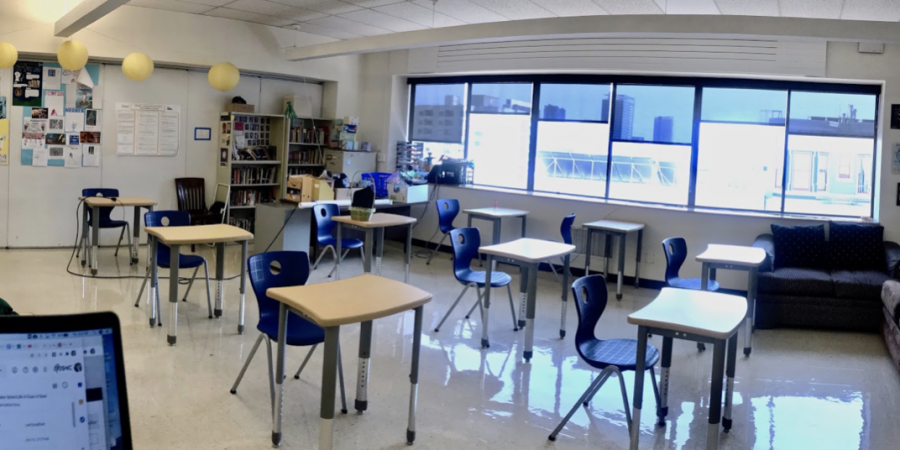Should Schools Reopen?
Room 505 on SHC’s La Salle Campus being prepared for in-person instruction.
As COVID-19 cases and deaths rise across the country, schools face a common dilemma: should they reopen? As a student, I’m confronting a similar problem. While my mental health is at risk during remote learning, is this a reasonable tradeoff to prevent the spread of COVID-19? Moreover, is it possible to safely reopen schools?
I believe elementary and middle schools should attempt to gradually reopen. According to the Centers for Disease Control and Prevention, school-aged students are less likely to experience severe symptoms or undergo an asymptomatic infection. Similarly, the death rate of children is significantly lower than the rate of adults. Overall, based on current evidence of schools that have already reopened, COVID-19 poses a minimal threat to school-aged children.
It is also crucial to acknowledge the benefits of in-person education when considering the reopening of schools. The American Academy of Pediatrics claims, “Evidence shows the academic, mental and physical benefits of in-person learning outweigh the risks from the coronavirus.” Based on personal experience from elementary and middle school, I thrived in environments where I could easily ask for teacher assistance and participate in hands-on learning. Children excel when surrounded by helpful classmates and encouraging teachers. When I was at a K-8 school, I often felt more motivated to work on an assignment when I was with my peers. Young students require a consistent academic push from educators.
The reopening of elementary and middle schools will also be beneficial for working parents and guardians. Before COVID-19, parents would not have to worry about tending to their child during the day because they were at school. Schools provided children with food, extracurriculars, and access to additional academic support. Now, with school primarily online, it is difficult for many parents to care for their young children while also working a full-time job. As a result, many parents have to pay for expensive child-care. This issue proves to be a local and universal problem. Jennifer Ciccone, a nurse practitioner with four kids in the Chicago area, has to wake up earlier and work longer hours, along with helping her children with online school. At the same time, parents can control and limit the social lives of young children, allowing for a safer household and school environment.
As a high school student, I am unsure whether the reopening of high schools would be more beneficial or harmful. Personally, I would love to go back to school. Staring at a computer screen for up to 6+ hours does no wonders for my mental health. I feel tired and drained midway through the day, hindering my motivation to complete my homework after school. During quarantine, teenagers have experienced an increase in anxiety and depression. When I look back at my experience at SHC, I enjoyed school much more when it was in-person. I was constantly surrounded by my friends, and I had easy access to teachers and administrators. I loved participating in sports and attending school events. Overall, I was a happier person. The SHC parent community also longs for in-person classes. 62.78% of SHC parents who took the fall 2020 survey claimed they would send their children back to in-person school as soon as possible.
However, I believe full in-person learning is difficult to attain at high schools. Many students have a variety of reasons why they can’t/don’t want to attend in-person school next semester. For example, numerous teenagers have at-home responsibilities, from taking care of a sibling or helping a parent with work. In another example, many students take public transportation to school; the data is unclear about the risks of COVID-19 transmission on public transportation. Students who live far away from the SHC campus might have to take public transportation to school, and that might not comply with their personal comfort level. Chiara Antipa ‘22 expressed a similar stance: “I really miss going to in-person school but some students’ personal circumstances make them unable to attend if school were to resume in person.” It would be unreasonable to ask every student at SHC to participate in learning on campus.
Additionally, unlike younger children, high school students are more likely to disobey social distancing regulations outside of school. Many teenagers feel they are being robbed of their high school experience, prompting them to congregate in large groups without masks. Therefore, when those students enter campus, they put many at risk. On the other hand, the high maturity level of high school students will allow them to follow social distancing procedures strictly while at school. Because of these reasons, I agree with SHC’s reopening guidelines. The administration states, “The health and safety of our entire community is our greatest priority.” When SHC plans to reopen in January, they will split each grade into two in-person cohorts, limiting capacity and social interactions. Another strictly online cohort will also be available to anyone who pleases. In-person school will be optional, so students who are unable to attend can easily continue to do online learning. If the school continuously regulates the health of students and attempts to enforce social distancing guidelines outside of school, anyone who wishes to participate in a hybrid schedule should be allowed to.







Darren Lew • Sep 18, 2021 at 9:50 pm
🙂